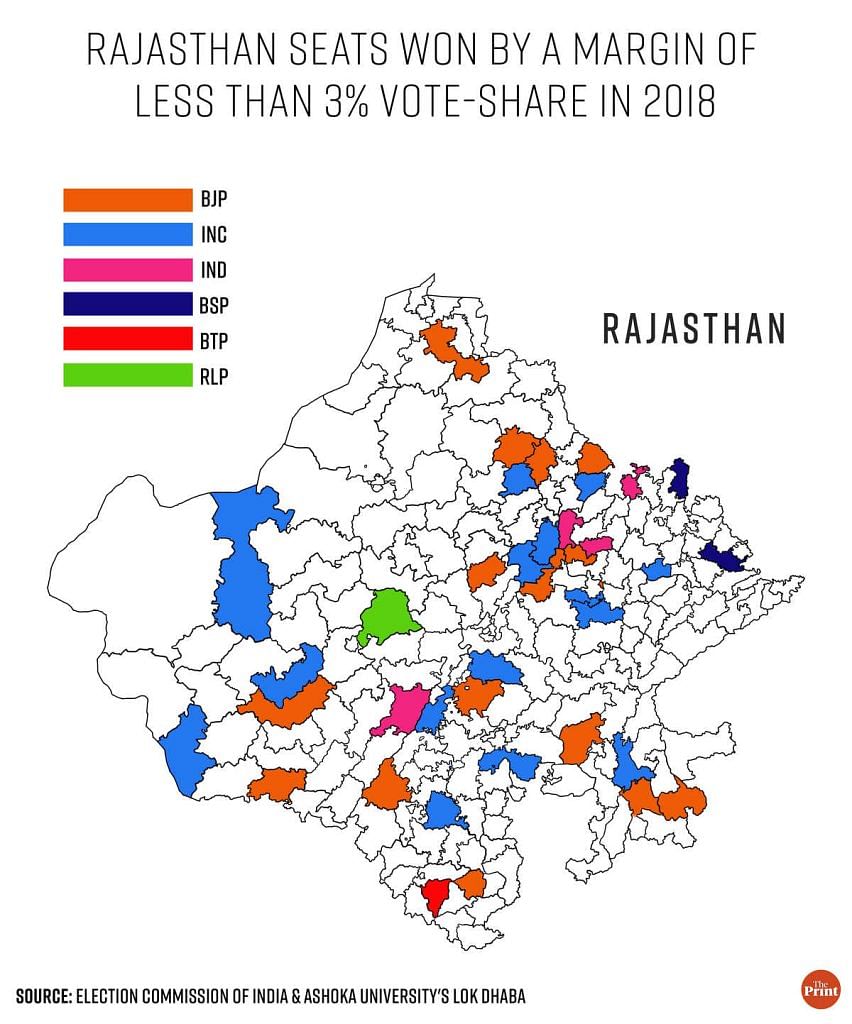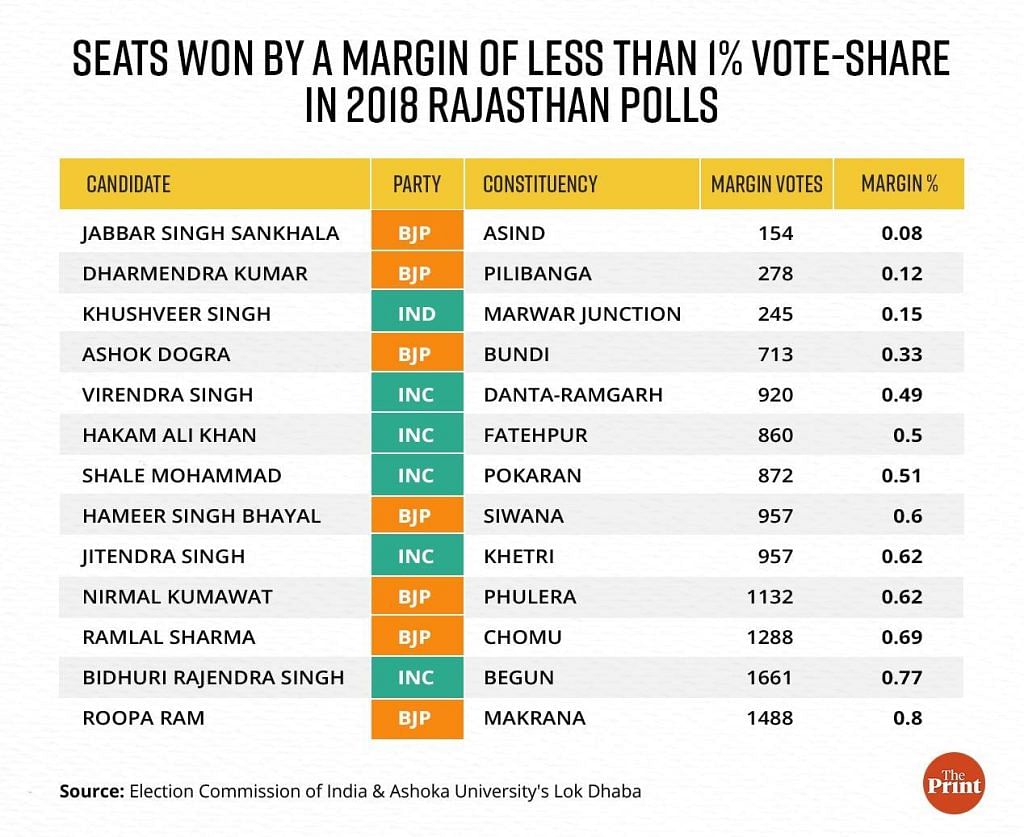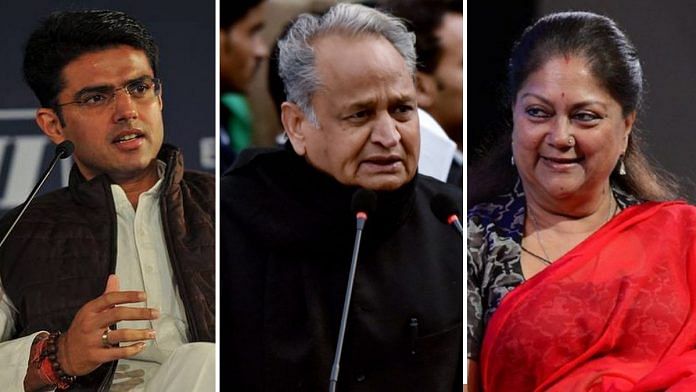New Delhi: One-fifth of Rajasthan’s 200 assembly seats were won by margins of less than 3 percent in the 2018 polls, an analysis by ThePrint has shown. This not only underscores the precarious nature of the upcoming November-December election, but also the risks that infighting within the BJP could pose to its prospects.
Since 1998, voters in Rajasthan have been changing governments in every election, alternating between the BJP and the Congress. In 2018, the Congress won 100 seats, one short of the majority mark, while the BJP got 73.
But this time around, the BJP is also grappling with factional conflict, some of it arising from the high command’s reluctance to project former chief minister Vasundhara Raje as its CM face even as she and her supporters assert her candidacy. Raje, notably, is the BJP’s most important mass leader in Rajasthan and could play a crucial role in determining the party’s fate in the election.
Out of the 40 seats with narrow victory margins in 2018, the Congress and the BJP were the main contenders on 31. On one more seat, Vallabhnagar, while the Congress won the seat, it was Jan Sena Rajasthan candidate who stood second and the BJP candidate was third.
In all, the BJP garnered narrow victories in 17 seats and the Congress in 15. Apart from these 32 candidates, four independents, two from the Bahujan Samaj Party (BSP), one from the Bharatiya Tribal Party (BTP), and one from the Rashtriya Loktantrik Party (RLP), also secured narrow victories.
About a year after the elections were held, all BSP MLAs joined the Congress. Out of the eight seats won by other candidates, on four each BJP and Congress stood second.

Overall, 16 candidates had a win margin of between 2 and 3 percent, 11 with 1 to 2 percent, and another 13 with less than 1 percent.
On over a dozen of these seats, the victory margin was even narrower than the number of votes received by NOTA (None of the Above).
Some wafer-thin victories were in seats considered to be party strongholds. One such case was Asind, where the BJP won six out of the last seven elections (the exception was in 2003 when an independent candidate won). In 2018, the BJP won but barely so, with party candidate Jabbar Singh Sankhala winning by just 154 votes, or a 0.08 percent margin of victory.
Then there were constituencies where historically close contests were even tighter in 2018. For instance, Pilibanga, a Scheduled Caste reserved seat, has seen closely fought polls for over three decades, with margins consistently below 5 percent. In 2018, BJP’s Dharmendra Kumar won by 278 votes (0.12 percent) over Congress’s Vinod Kumar.
In Marwar Junction, meanwhile, both national parties struggled to gain ground, and an independent candidate, Khushveer Singh, who had rebelled against the Congress, secured a win by a margin of just 245 votes (0.15 percent).

Speaking to ThePrint, Prof. Shyam Mohan Agarwal from the political science department of the University of Rajasthan explained why these 40 seats are crucial to both the Congress and the BJP.
“These seats are very important when it comes to government formation. In these seats, both BJP and Congress will lay special focus because results can easily go either way,” he said. “Sometimes with very few votes, victory and defeat can change hands. With a single vote, governments are formed. With a single vote, seats are won.”
Agarwal also gave the example of Congress leader C.P. Joshi, currently the Speaker of the Rajasthan assembly, who lost in 2008 from Nathdwara by a single vote. At that time, Joshi, considered close to Rahul Gandhi, was tipped to be the Congress high command’s choice for CM in place of Ashok Gehlot. “In that sense, even 1 percent is a lot,” Agarwal observed.
Also Read: BJP won 105 LS seats by 3 lakh+ votes in 2019, up from 42 in 2014. What it could mean for 2024
Thin ice for BJP?
In 2018, the BJP created something of a record with its small margins of victories across regions. In some cases, this represented a positive indicator for the party.
For instance, no incumbent MLA had recaptured Siwana in Barmer district since 1962. However, BJP’s Hameer Singh Bhayal broke this trend, albeit by a mere 957-vote margin (0.6 percent).
Similarly, Raniwara, held by BJP MLA Narayan Singh Dewal, had not been won by an incumbent candidate since 1980, but in 2018, he won by 3,405 votes (1.83 percent). Chomu, which had seen no successive wins by a party since 1962, was retained by the BJP in 2018. Ramlal Sharma won by a margin of 1,288 votes (0.69 percent).
Meanwhile, several BJP stalwarts just about managed to scrape through to victory. Former ministers Rajendra Singh Rathore (Churu) and Pratap Singh (Chhabra) were both on the brink, with victory margins of 1,800 and 3,700 votes, respectively. Another four-time MLA and former minister in Vasundhara Raje government, Kalicharan Saraf, secured his seat with just a 1,700-vote lead.
Agarwal said that to ensure victory on such seats, BJP will need a united house of leaders.
Notably, while the Rajasthan BJP has had heavyweights such as former three-time CM Bhairon Singh Shekhawat in the past, it was only under Vasundhara Raje’s leadership that the party secured an independent majority in 2003, winning 120 out of 200 seats.
Although Raje suffered defeat in the subsequent election, she led the BJP to a resounding victory in 2013, securing 163 seats.
However, with the party’s central leadership hesitant to project her as the face of the party in the upcoming election, other contenders have reportedly emerged, including Union minister Gajendra Singh Shekhawat, Lok Sabha Speaker Om Birla, former state BJP president Satish Poonia, and BJP state president C.P. Joshi.
BJP leaders close to the central leadership have argued that sidelining Raje and other claimants to CM candidacy is a strategy to “prevent infighting”. Nevertheless, with Raje apparently not on board with the central leadership and considering her large following in the state unit of the BJP, seat margins may potentially be affected.
Challenges for the Congress
The Congress has formed governments in Rajasthan twice in the last two decades but has been unable to secure a clear majority, obtaining 96 seats in 2008 and 100 in 2018.
Significantly, in 2018, rebel candidates played a role in depriving the party of its majority. Two rebels, Baljeet Yadav and Alok Beniwal, managed to wrest their respective seats from the official candidates, winning by nearly 3,800 votes each.
Of the 15 seats that the Congress won with a narrow margin, two were contested by senior leaders known to be staunch supporters of the Gehlot government. While state minority affairs minister Saleh Mohammad held onto his seat by a mere 339-vote lead, advisor to the CM and four-time MLA Jitendra Singh won by just 957 votes.
Political analyst Om Saini attributes the Congress falling short of the majority mark in 2018 partly to Gehlot detractor Sachin Pilot.
“Sachin Pilot was the PCC chief and he gave the ticket to his own men, who ended up on the losing side. Otherwise, the Congress would have had an easy majority. The seats that went to BSP and other smaller parties, could have been restricted to Congress,” he told ThePrint.
Saini added that the Congress appears to have adopted a different strategy this time, relying primarily on the results of internal surveys for ticket distribution. Furthermore, there are indications that the Congress has brokered an apparent truce between Ashok Gehlot and Sachin Pilot.
It’s worth noting that since 1998, no incumbent party has secured victory in Rajasthan, prompting the Gehlot government to intensify its efforts in recent months to counter anti-incumbency sentiments through various means, including launching an array of welfare schemes.
However, as Saini puts it: “When the wind changes, everything changes. Then percentages don’t matter.”
(Edited by Asavari Singh)



